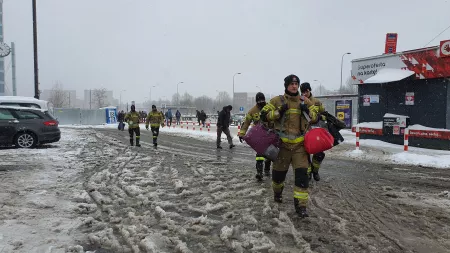It was the most rapidly-evolving humanitarian crisis since the end of the Second World War. When the fighting in Ukraine started on February 24, the result was a human catastrophe: millions of people left their homes, critical infrastructure was destroyed, whole cities were left without food, water and electricity. Today, more than 6.4 million people have fled the country, over 8 million people are displaced within Ukraine. Once again, women and children bear the brunt of this crisis. Women and children make up for 90% of refugees and women represent 63% of the internally displaced.
Three months into the conflict, CARE staff and partners inside Ukraine and the surrounding areas share insights from the frontlines:
Ukraine: Critical race for medical supplies as fuel shortages hamper humanitarian response
Since February, the UN has recorded 236 attacks on health care facilities, and humanitarians on the ground face a variety of logistical challenges in their daily race to reach people in need: “Due to permanent shelling, it's incredibly difficult to deliver medical supplies to frontline hospitals that are in great need of them”, reports Valeria Tatarchuk, Founder and Managing Director from CARE’s partner organization Tvoya Opora. “Another problem is the fuel crisis. It significantly reduces our ability, we simply can't always reach everyone in need.”
CARE warns that the medical situation in all parts of the country remains critical, putting women and girls of reproductive age at severe risks. According to the United Nations Population Fund, an estimated 80,000 women will give birth in the next three months in Ukraine and many of them will not be able to rely on critical maternal health care.
In addition to maternal health care, reproductive needs such as family planning, menstrual hygiene and other medical support are critically underserved in the context of displacement and continuous fighting.
“A safe birth is not something to be taken for granted anywhere”, notes Siobhán Foran, CARE’s regional Gender in Emergencies Coordinator. “But in Ukraine, pregnant women often don’t even know whether they will receive any care at all, nor whether the places they planned to deliver will be safe from fighting”.
Poland: Education opportunities offer a lifeline to refugee teachers and children
In April alone, the UN reported that over 100 children had been killed in Ukraine and 1,748 educational facilities attacked. For those children who have fled abroad, education remains a challenge: In Poland, 195,900 Ukrainian children are in need of schooling and kindergarten. In partnership with the Polish Center for International Aid, (PCPM), CARE hires Ukrainian refugee teachers and interpreters to work in Polish schools. Daria Khyshenko has been part of this program since April. She herself is a mother who has been forced to navigate these uncertain times while continuing to make her son’s education a priority.
“School is the most important thing for both kids and parents. For the kids, they are so happy to see each other, even though they don't know each other. For parents, it gives parents time to do something else,” tells Daria. “Their child is at school in a safe place with teachers, so mom can go to apply for help, for a job etc. This routine is important for all of us. Instability is the worst.”
Romania: Psychosocial support provides relief to traumatized Ukrainians
Psychologists have predicted that about a third of Ukrainian refugees will develop depression, anxiety disorders or post-traumatic stress disorders.
Florian Koleci, a psychiatrist with training in cognitive behavioral therapy and art therapy, is among 500 psychiatrists, social workers, and healthcare workers on the Romania-Ukraine border and in transit hubs who recently received emergency psychosocial support and trauma-counseling training. “I myself volunteered and worked with Ukrainians arriving at the central train station in Bucharest and at the airport. Most people I spoke to were dealing with the kind of issues you would expect when leaving home and leaving everything behind – many were practical issues like challenges of travelling onwards or how to stay and work in Romania. Mainly I try to listen and give them the space to think these things through.” Koleci said.
How CARE International is helping:
As of 12 May, CARE International and our partners have reached over 260,000 people in need of assistance in Ukraine, Poland, Romania, Moldova and Georgia with shelter, education, food, water, hygiene items, psychosocial support, gender-based violence support and cash assistance. Funds generously received from our supporters globally will be distributed over a period of three years to meet the ongoing needs of people affected by this conflict.
